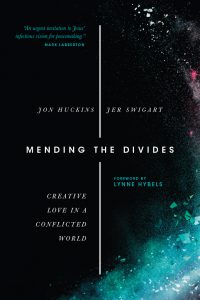 Mending the Divides: Creative Love in a Conflicted World
Mending the Divides: Creative Love in a Conflicted World
Jon Huckins and Jer Swigart
InterVarsity Press
What is the subject?
Mending the Divides addresses the topic of peacemaking by making the case that peacemaking is central to following Jesus. The authors share from their own experiences, repeatedly inviting the reader to consider joining the “everyday peacemaking movement.” The book’s purpose is clearly stated: “…to equip you to live a similar story and be a partner in the [peacemaking] movement.” The goal is also to broaden the myopic North American view of this subject. God’s mission is peacemaking.
Who are the authors?
Co-authors Jon Huckins and Jer Swigart are cofounding directors of The Global Immersion Project, an organization that trains people for peacemaking. Both are involved in local church ministry in the U.S. They write in the first-person (always clearly identifying the specific author) using many examples from their own lives.
Why this book?
I find myself reflecting on my own understanding of peacemaking. As an MB pastor, I know what our Confession of Faith states, but the practical realities that I face in my world are much more complex than simply being opposed to war. Conflict is everywhere, and the local church and local community are no exception. The topic is pertinent to our witness as individuals and as a congregation. The book challenged me more than I hoped it would. It caused some personal unsettledness.
Theological perspective
Mending the Divides makes a clear case to live as everyday peacemakers. The call to peacemaking is framed around who God is and who humanity is. Further details are built around the parable of the Good Samaritan. This is a needed message for the North American church.

What better place to practice creative love than in one’s own family?
One might also consider the role of sharing stories in explaining theology. This book is full of real life experiences. This makes it very readable and engages a significant topic in a much more practical way than merely stating facts and making theological arguments.
Another issue is that of creative love. The authors urge that love is paramount. And lest the book simply remain a high-level analysis of peacemaking, the authors include practical steps. Following the included roadmap will lead to opportunities to share creative love into a variety of conflicted situations.
Key insight
The book does an excellent job of articulating the broad scope of conflicts one encounters and is clear in the call to be a part of the everyday peacemaking movement. Mending the Divides aims to convince and inspire readers to pursue peace. It provides a detailed explanation of four processes (see, immerse, contend, restore), yet refrains from attempting to provide specific solutions for every possible scenario. It’s a call to everyday peacemaking relying on the Holy Spirit’s guidance.
Downside
The case of everyday peacemaking is clearly articulated, but some major arguments against this approach are not addressed with any great amount of detail.
Other relevant information
The authors do not shy away from contentious issues for many evangelicals when listing examples of everyday peacemaking (e.g., the Israel-Palestine situation, acceptance of the LGBTQ community in church).
Who should read it?
This is a great book for anyone struggling with any level of conflict, including conflict of how to live as a Christian in North America today. The book will both challenge and inspire. Read it.
I would also suggest that this book can be used as a conversation starter for parents and children. Often there is little peace within families. There are many pertinent topics in culture that provide ample opportunities to show creative love and everyday peacemaking.
Favourite quotes
“Peacemaking is the mission of God and the vocation of God’s people. While it’s hard work, peacemaking is neither a strategy to employ nor an obligation to uphold. It is a life fueled by our identity as the reconciled beloved.”
“It’s time to recognize that our words of “peace” mean nothing if they emerge from the simmering ashes of broken relationships, turf wars, and theological witch hunts.”
“Peacemaking isn’t a reaction to conflict; it’s a way of life.… Being a peacemaker is what it means to follow Jesus.”
[Leonard Klassen is the co-lead pastor at King Road Church in Abbotsford. Pastoral work involves conflict and many opportunities for everyday peacemaking. He will be sharing this book, complete with many scribbled notes and dog-eared pages, with his co-workers.